Graduation Ceremony
Date: 18 July 2025
Time: 09:30
Venue: The Great Hall
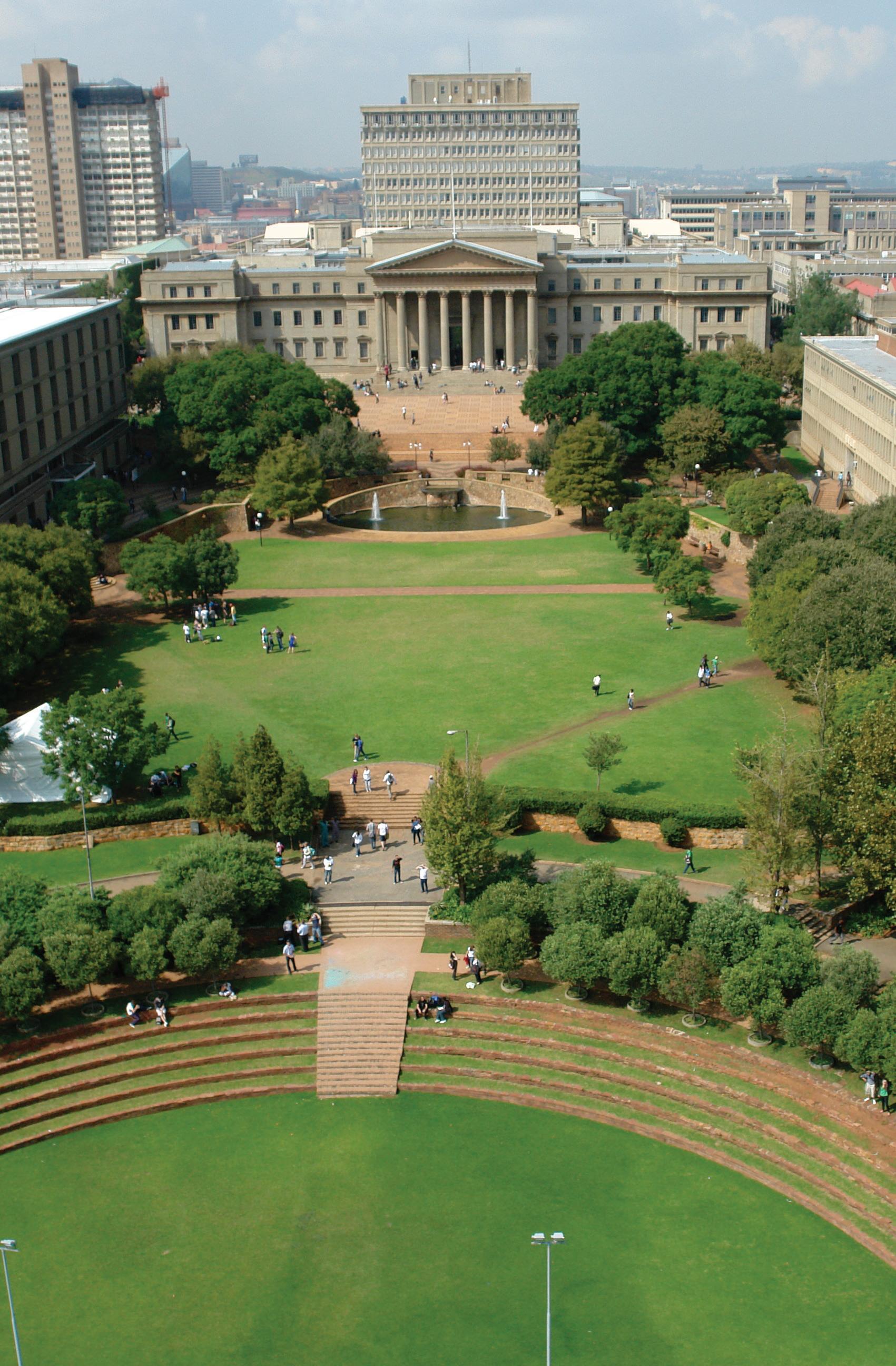

Date: 18 July 2025
Time: 09:30
Venue: The Great Hall

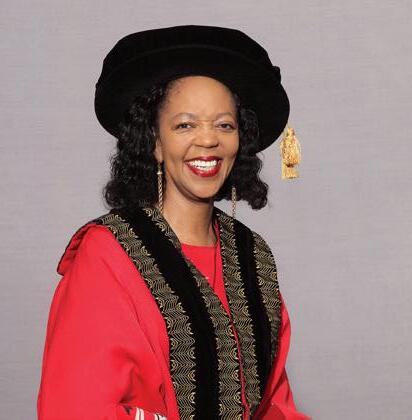
CONGRATULATIONS! HALALA!
GO LEAD SOUTH AFRICA TO GREATNESS!
A hearty congratulations to the class of 2025! Some of you are the first graduates in your family, well done! May your light shine for those who come after you! For those of you who are continuing in your family’s tradition, thanks for not dropping the ball. Education is the best self-investment. The past year changed the world as we know it, with no less than 60 countries and more than 1.3 billion people globally going to vote, including our own country. The outcomes have changed geopolitics, with the Global North becoming more internally focused. The resurgence of economic protectionism has altered trade landscapes, causing ripples across global markets. The rise of artificial intelligence and big data further reshapes the balance of power, as nations compete for supremacy in these fields. Climate change, a universal threat, has become a catalyst for geopolitical tension. The race for control over natural resources, especially in the Arctic and other vulnerable regions, has intensified. South Africa has not been spared in the regional conflict, losing our own young fighters for peace in the DRC.
As the twentieth meeting of the Group of 20 heads to our shores, a first for the continent of Africa, we have chosen Solidarity, Equality and Sustainability as our G20 theme. This speaks to our recognition of the interconnected of nations. Our shared future depends on mutual understanding, cooperation, equality and stability across nations. As our future leaders you need to adapt to an uncertain world, embrace diversity, and foster dialogue. That will help you to craft a healthier, more balanced world for future generations.
As you venture into the world, take time to expand the depth and breadth of your knowledge. Read outside your specialisation, engage with people outside your comfort zone. Understand the plight of people less fortunate than yourself. Be the change you want to see in your country first then the world. Leaders who leave footprints worth emulating, are not only the brightest but also those who take time to learn from others, who are accountable for their actions and omissions, who use what they know and what they have, to make the world a better place. Leaders who care. Those leaders do this consistently with Humility and Integrity, Always. May you be those leaders! HALALA!
CONGRATULATIONS! HALALA! GO LEAD SOUTH AFRICA TO GREATNESS!
Dr Judy Dlamini Chancellor
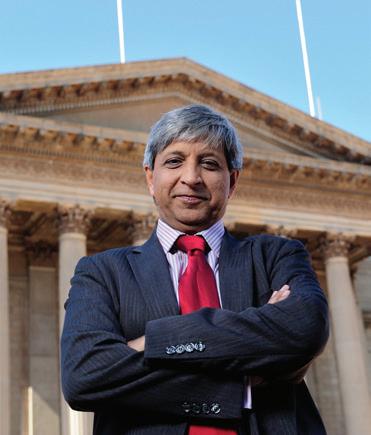
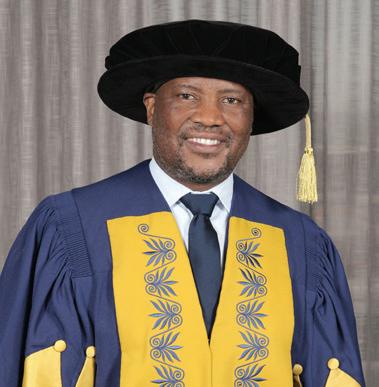
Dear Wits Graduate,
Congratulations on successfully completing your academic programme at the University of the Witwatersrand, the premier University on the continent.
You are now a member of an elite group of graduates of this august institution. More than 200 000 alumni at the cutting edge of excellence, both locally and internationally in business, the public sector, the academy, and in civil society have trodden this path.
Today, you become a member of this illustrious community.
Over the past 100 years, Wits has grown into one of the leading universities on the continent and a globally respected institution for its teaching and learning, knowledge creation and generation, and social impact. It has shaped the lives of many for the advancement of society. You are now an integral part of this proud and enduring legacy. Here at Wits, we actively pursue excellence and societal relevance in everything we do. From the abstract to the practical, our focus is on creating a space for the best thought, knowledge, and expertise to be unearthed and nurtured.
Wits is renowned for its intellectual leadership and for nurturing critical thinkers, creative innovators, problem-posers, and problem solvers. We have strived to match your ambition and drive to overcome the challenges thrown our way by the pandemic. Together we have reached the crest of the hill and proven, once again that excellence is achievable, even in times of uncertainty and adversity.
Your success has furthered our commitment to equipping the next generation of leaders with the skills and determination that you will need to find innovative and sustainable solutions to the pressing problems of the 21st Century.
As a Wits graduate, you had access to an exceptional educational experience. You have been exposed to a world-class academic and research programme and a vibrant community that makes you a true global citizen. You have been part of an institution that generates cutting-edge knowledge and innovation for South Africa and the world. It is now time for you to step into the world and use that experience, for good. We know that you will enter the next stage of your journey with the determination to build a better society tomorrow. I want to encourage you to remain a part of the Wits family by participating in our alumni programme and by further advancing the reputation of your alma mater.
Best wishes for the next steps of your journey and congratulations on being such a big part of the history of this illustrious institution.
Professor Zeblon Vilakazi, FRS Vice-Chancellor and Principal Wits University
Gaudeamus igitur
Juvenes dum sumus
Post jucundum juventutem
Post molestam senectutem
Nos habebit humus.
Ubi sunt qui ante nos
In mundo fuere?
Vadite ad superos
Transite in inferos
Hos si vis videre.
Vita nostra brevis est Brevi finietur.
Venit mors velociter
Rapit nos atrociter
Nemini parcetur.
Vivat academia
Vivant professores
Vivat membrum quodlibet
Vivat membra quaelibet
Semper sint in flore.
Vivant omnes virgines
Faciles, formosae.
Vivant et mulieres
Tenerae amabiles
Bonae laboriosae.
Vivant et republica et qui illam regit.
Vivat nostra civitas, Maecenatum caritas
Quae nos hic protegit.
Pereat tristitia, Pereant osores.
Pereat diabolus, Quivis antiburschius
Atque irrisores.
Let us rejoice therefore
While we are young.
After a pleasant youth
After a troublesome old age
The earth will have us.
Where are they
Who were in the world before us?
You may cross over to heaven
You may go to hell If you wish to see them.
Our life is brief
It will be finished shortly.
Death comes quickly Atrociously, it snatches us away. No one is spared.
Long live the academy!
Long live the teachers!
Long live each male student!
Long live each female student!
May they always flourish!
Long live all maidens
Easy and beautiful!
Long live mature women also,
Tender and loveable
And full of good labor.
Long live the State
And the One who rules it!
Long live our City
And the charity of benefactors
Which protects us here!
Let sadness perish!
Let haters perish!
Let the devil perish!
Let whoever is against our school
Who laughs at it, perish!
Nkosi sikelel’ iAfrika
Maluphakanyisw’ uphondo lwayo,
Yizwa imithandazo yethu, Nkosi sikelela
Thina lusapho lwayo.
Morena boloka setjhaba sa heso, O fedise dintwa le matshwenyeho, O se boloke, O se boloke setjhaba sa heso, Setjhaba sa, South Afrika — South Afrika.
Uit die blou van onse hemel, Uit die diepte van ons see, Oor ons ewige gebergtes, Waar die kranse antwoord gee,
Sounds the call to come together, And united we shall stand, Let us live and strive for freedom In South Africa our land.
The Wits Choir
The Wits Choir has been around since 1995. Their repertoire is colourful and vibrant. They perform regularly at graduations and important ceremonies. The Wits Choir has toured internationally as well as playing host to other choirs here. They are also active in the community, undertaking choral outreach programmes.
18 JULY 2025 AT 09:30
The audience will rise as the academic procession enters the hall and will remain standing until the Vice-Chancellor is in place
The Vice-Chancellor will constitute the congregation
The Vice-Chancellor will welcome the graduands and guests
Address to the congregation
Conferment of degrees
The Acting President of Convocation will address the graduates
The Vice-Chancellor will dissolve the congregation
The audience will stand while Ihele is played
Members of the audience are requested to stand while the academic procession leaves the hall and not to leave the hall before the end of the ceremony.
In the event of load-shedding or power cuts, the Great Hall may become totally dark until the generator comes into operation.
DEAN: PROFESSOR M MUSEMWA BA Hons (Zimbabwe) MA (Cape Town) PhD (Minnesota, USA) MASSAf
AJODHYA, Sachin Adarsh Psychology RESEARCH REPORT: Exploring the phenomenology of self and other embodiment of the virtual self, using immersive virtual reality
BEN, Siyathemba Zimkhitha Journalism and Media Studies RESEARCH REPORT: The news consumption habits of Generation Z in Johannesburg
BOUSFIELD, Jacquelene Linda History RESEARCH REPORT: Fast Food and Slow Change: a preliminary look into the evolution of Dining and Consumer Culture in Johannesburg
CAMERON, Johanna Annette (with Distinction) Psychology RESEARCH REPORT: Determining the relationship between the n-Back Task, Symbol Span subtest, Digit Span subtest and Symbol Digits Modality Test
CHIMUKA, Chiedza Siobhan (with Distinction) Organisational Psychology RESEARCH REPORT: "Clean Water for All, But at What Cost?" A Choice Experiment Analysis of Mining Affected Communities
DAVIDS, Lemeeze (with Distinction) Contemporary Curatorial Practice DISSERTATION: Exhibiting Memory: Investigating the use of multi-sensory elements to communicate diasporic experiences in contemporary art exhibitions
DAVIDS, Sisanda Victoria (with Distinction) History of Art RESEARCH REPORT: Performative Materiality: Exploring Meanings and Expressions in the Artworks of South African Contemporary Artist Sikhumbuzo Makandula
DAVY, Michael William History DISSERTATION: The Politics of Unity in Sport: a Study of the Unity Processes and their Consequences in Non-Racial Sport 1973-1996
GAMA, Kwanele Migration and Displacement RESEARCH REPORT: Exploring the survival strategies of migrant drivers in the e-hailing sector
GOULD, Alexandra Dominique History RESEARCH REPORT: Producing Knowledge about Women's Experience of the Holocaust: Memoirs as History and Documenting the Unspeakable
GOVENDER, Danet (with Distinction) Linguistics DISSERTATION: Interrogating Playboy: Has the Discourse Changed? A Qualitative Inquiry of Intimate Citizenship
HLONGWANE, Bungcwethi Zanele (with Distinction) Development Studies DISSERTATION: Narrative Identity, Visibility, and Community: Theorising "QueerTok" as a Digital Consciousness Raising Space
ISMAIL, Raeesah (with Distinction) Psychology RESEARCH REPORT: Psychological Wellbeing Among South African Women with Endometriosis: a Quantitative Study
JACKSON, Brendan James Digital Arts DISSERTATION: Choose Your Character: The Motivations behind Character Selection in the Art of Cosplay
KALONJI, Nelly Bidingisha (with Distinction)
Social and Psychological Research RESEARCH REPORT: Social media and digital flourishing in South Africa
KEKANA, Ezekiel Pepe Journalism and Media Studies RESEARCH REPORT: Media Coverage of Domestic Women's Football in Soccer Laduma and KickOff
KESENI, Siphokuhle Cleopathra Drama Therapy RESEARCH REPORT: Exploring Stigmas and Emotions of Transgender People Using Rasa Theory and Rasaboxes in Drama Therapy
KIRSCH, Adam Peter (with Distinction) Italian RESEARCH REPORT: The Gothic Viscount: a critical reading of Italo Calvino's Il visconte dimezzato through a gothic lens
KLUG, Karin Lee Psychology DISSERTATION: Teacher attachment styles and the management of insecurely attached Foundation Phase learners
KORTJE, Tyler Joshua (with Distinction) Organisational Psychology RESEARCH REPORT: Green-minded fear: Addressing Eco-anxiety through Environmental Self-efficacy
KRITHARIS, Thalia Greta (with Distinction)
Social and Psychological Research RESEARCH REPORT: The Psychometric Properties of the NEO PI-R in South Africa
LEE, Daniel (with Distinction) History DISSERTATION: On the Scene in Soweto: Navigating Queer Nightlife and Social Networks in Soweto, 1980 - 1999
LEGODI, Itumeleng
Social and Psychological Research RESEARCH REPORT: Investigating the relationships between verbal fluency, processing speed, and demographic variables in a multilingual South African Sample
LEONARD, Tao International Relations RESEARCH REPORT: Beneath the Surface: Countries' Interests in Deep Seabed Mining within Ocean Governance Architecture. A case analysis of how the ocean floor excavation stances of member countries affects the international Seabed Authority
MAHLATJI, Thupetsi Lucky (with Distinction) Linguistics DISSERTATION: A comparative study on the development of explanatory abilities in South African Bantu languages
MAKHALE, Thihangwi Josephat Social Development RESEARCH REPORT: Experiences of Ekurhuleni Non-Profit Organisations in rendering psychosocial support services to enhance people's well-being
MALINGA, Phindile Susan Anele
Social and Psychological Research RESEARCH REPORT: Transition from Secondary to Tertiary Education Pre and Post Covid-19: Preparedness and Challenges
MANAKA, Sharon (with Distinction)
Social and Psychological Research RESEARCH REPORT: A critical review of Indigenous women's knowledge systems related to gender-based violence in the Global South
MANCE, Megan Winifred (with Distinction)
Publishing Studies RESEARCH REPORT: Exploring the Editor-Author Relationship in a Multi-Cultural Context: The Influence of Editorial Interventions and How the Author Experiences Them in the Process of Finalising and Producing the Published Book
MANETSI, Linda Mzwakhe Mhletywa
Political Studies RESEARCH REPORT: Technological Penetration in Local Government: The Use of Technology to make government and service delivery accessible to poorer communities. A case study on City Power
MASIKANE, Silindelokuhle
Journalism and Media Studies RESEARCH REPORT: What impact did COVID-19 have on the coverage of court cases in South Africa by television broadcasters?
MBINGO, Sivuse Bantubonkhe RESEARCH REPORT: Changes in work organization in the textile industry: a study of Eswatini textiles under AGOA
MEHMOOD, la Raiba
Social and Psychological Research RESEARCH REPORT: An exploration of cognitive flexibility development in South African 4- and 5-year-olds
MENELL, Katherine Anne (with Distinction)
Drama and Film DISSERTATION: Responding to trauma: In what ways can an embodied expressive narrative approach strengthen the agency of women who have experienced abuse?
MKHIZE, Mawande Nomfundo
Drama Therapy RESEARCH REPORT: Ndim Lo, Masidlale: a critical exploration of the importance of culture and diversity in South African Drama Therapy spaces
MODISE, Karabo Gloria
Organisational Psychology RESEARCH REPORT: The Psychological impact of Teacher Targeted Bullying and Harassment (TTBH) on Teachers: A Scoping Review
MOGOTSI, Ratanang Salome
Cultural Policy and Management RESEARCH REPORT: So, where to (So-we-to) with audiences? An explorative inquiry into audience development strategies at Soweto Theatre in the period 2019 -2023
MOHLALA, Lesiba Goodwill
Demography and Population Studies RESEARCH REPORT: The association between living with a disability and undiagnosed hypertension amongst South African males aged 15 years and older
MOLOI, Tumelo
Cultural Policy and Management RESEARCH REPORT: Beyond Cultural Work: an exploration of the place of various professionals in solo exhibitions of established visual artists in Johannesburg
MOLOTSI, Lebohang (with Distinction) Psychology RESEARCH REPORT: Exploring the affective-discursive dynamic of how South African Black women negotiate public spaces in Gauteng
MOREIRA DA SILVA, Bianca Erin
Organisational Psychology RESEARCH REPORT: Teacher-Targeted Bullying and Harassment (TTBH), Coping, Wellbeing, and Intention to Leave: A Quantitative Study in Gauteng Schools
MPOFU, Jethro William (with Distinction) Political Studies DISSERTATION: Robert Mugabe: Political Thought and Practice as the Will to Power
MUHAMMAD ARIF, Shabina Arif (with Distinction)
Organisational Psychology RESEARCH REPORT: Work Stress, Displaced Anger, Gender, and Anti-Social Online Behaviour (AOB)
MUSEE, Chelsea Kathini
Publishing Studies RESEARCH REPORT: Kiswahili adult fiction publishing in South Africa, how SMME's can contribute and benefit
MUTHAYAN, Nerissa (with Distinction) E-Science RESEARCH REPORT: Shutting It Down: Investigating the Implementation of Internet Shutdowns
NATH, Dipika (with Distinction) Creative Writing DISSERTATION: The Shadow Pool
NCHABELENG, Gilbert Sepobe
African Literature RESEARCH REPORT: Identity and Belonging for Second-Generation Migrants in Contemporary African Fiction
NDLOVU, Octavia Nombulelo E-Science RESEARCH REPORT: Understanding Climate Change in South Africa: An Analysis of the Perceptions of Affected Communities
NGCOBO, Melisa Social Development RESEARCH REPORT: Exploring the impact of BRICS collaboration on social development initiatives in South Africa
NGWATLE, Lebogang Gladness Arts and Culture Studies RESEARCH REPORT: Capturing the value of culture through a narrative case study of Funda centre
NKOGATSE, Hubela Betty Psychology RESEARCH REPORT: The discourses of Western and African medicine in South Africa
NOMAELE, Obvious Sekhumbuzo
Film and Television DISSERTATION: The Construction, Deconstruction, and Reconstruction of Black Queer Identity Through Mechanisms of Representation and Narrative Devices in South African Media
NOVEMBER, Sibusiso Applied Drama: Theatre in Education, Communities and Social Contexts RESEARCH REPORT: How Can Forum Theatre Be Used to Help Students in Township Schools with Career Guiidance?
NTANTALA, Noxolo Khabo
Social and Psychological Research RESEARCH REPORT: A Discourse Analysis of news reports on farm murders in South Africa
NTLATLENG, Nkamogeleng Kgomotso Mmalesiba (with Distinction)
Social Development
RESEARCH REPORT: Working Collaboratively to Support Learners who experience Barriers to Learning: Perspectives of Social Workers, Teachers and School-based Support Team members at selected Primary Schools in Tshwane
PATTNI, Rheyna (with Distinction)
International Relations RESEARCH REPORT: The Case for a Pluriversal IR: an Inquiry into Andean Cosmovision and Akan Philosophy
PUDUMO, Kafuwa Rethabile Psychology RESEARCH REPORT: The Exploration of Supervision as A Mode to Combat the Possible Future Development of Compassion Fatigue Among Social Workers
REES, Bronwen Caryl (with Distinction) English DISSERTATION: The Persistence of Modernism in Damon Galgut's In a Strange Room, Arctic Summer and The Promise
ROSENDORFF, Alexandra (with Distinction) Drama Therapy RESEARCH REPORT: Emotional Algorithms: Exploring the use of Artificial Intelligence for storytelling and role play in Drama Therapy
RUSSELL, Leonardo Noah Psychology DISSERTATION: The use of defensive masculinities by transgender men in the South African workplace
SEPTEMBER, Denisha Meagan
Social and Psychological Research RESEARCH REPORT: Exploring the Role and Politics of Affect in Relation to a/the Call for Decolonization: a #Feesmustfall perspective
SITHA, Thandeka Nompumelelo Sociology RESEARCH REPORT: Livelihood strategies of unemployed youth. a case study of Coligny, North-West
THWALA, Thandolwethu (with Distinction) Anthropology RESEARCH REPORT: Community Leadership During the COVID-19 Pandemic and Lockdown in Diepsloot
TSHUMA, Sindy Phanankosi (with Distinction)
Organisational Psychology RESEARCH REPORT: An Exploration of General Aviation Occurrences in South Africa (2015-2017): Application of the Human Factors Analysis and Classification System using Bayes' Theorem
TSOTETSI, Lerato Prudence Psychology RESEARCH REPORT: Investigating knowledge, attitudes and challenges for digital mental health interventions among youth in Soweto, South Africa
VAN BOOM, Storm Muriel (with Distinction)
Social and Psychological Research RESEARCH REPORT: An Online Screening tool for Anxiety in the South African Population: a Systematic Review
VAN RHEEDE, Jordan-Lee
Organisational Psychology RESEARCH REPORT: The Mediating Role of Psychological Capital in the Relationship Between Organisational Resources and Flourishing
VAN STADEN, Stefanus Petrus Creative Writing DISSERTATION: When They Burn My Shadow
VAN ZYL, Karolien (with Distinction)
Contemporary Curatorial Practice RESEARCH REPORT: Mooi Nooi: Sculpting Identity - Anton van Wouw's Noitjie van die Onderveld as Fetished Symbol
VUNANDLALA, Malibongwe Cyprian
Organisational Psychology RESEARCH REPORT: Factors Influencing Career Choice: a Comparison between Undergraduates from Rural and Private Secondary Schools
WENTZEL, Leané (with Distinction)
Drama Therapy RESEARCH REPORT: Using Participatory Action Research to Explore How Teachers Can Implement Drama Therapy Techniques to Aid in Nervous System Regulation in the Senior -Phase Classroom in South Africa
GOVENDER, Jade Evrille DISSERTATION: Hearing and Hearing Loss Management in Children with Down Syndrome in Qatar
LOONAT, Tayyiba DISSERTATION: Getting used to hearing aids: The geriatric users' perspective in Gauteng, South Africa
NTULI, Senamile Gcinile (with Distinction) DISSERTATION: Exploring the Professional Quality of Life of South African Audiologists
FILMER, Linda May (with Distinction)
RESEARCH REPORT: Psychotherapists' experiences of working with religion and spirituality in psychotherapy
HABIB, Sumaya
RESEARCH REPORT: The South African Indian Hindu community's understandings and experiences of psychosocial disability
MAGAPE, Ogone Innovation
RESEARCH REPORT: Raising a child with autism spectrum disorder: Black South African parents' reported lived experiences
MAHARAJ, Kajal
RESEARCH REPORT: Examining Available Behavioural and Social Interventions for Children with Autism Spectrum Disorder in Developing Countries in Africa - A Scoping Review
MALETE, Lesedi
RESEARCH REPORT: Sociocultural Experiences of Bereavement Following Fatal Road Traffic Accidents for Urban Black South Africans
MATI, Iviwe Vuyolwethu
RESEARCH REPORT: A Discourse Analysis of Male Engineering Students Perceptions of Gender Equality and Women Empowerment in South Africa
MAYET, Safiyyah
RESEARCH REPORT: Demographic Profiling of South African Young Adults in Relation to Post-Traumatic Stress Symptomatology
MOGOMOTSI, Tumelo Christian RESEARCH REPORT: The Forgotten Child: The Experience of South African Young Black Male University Students Growing up without their Biological Fathers
PRICE MOOR, Courtney Kathy (with Distinction) RESEARCH REPORT: Situational factors in male homicide victimisation: a mixed systematic review
SELEBI, Lerato (with Distinction)
RESEARCH REPORT: Black Therapists' Experiences of Class Within Same-Race Psychodynamic Psychotherapy in South Africa
SOUNES, Daniela (with Distinction)
RESEARCH REPORT: Subjective Experiences of Working as A Healthcare Worker in South Africa: a Qualitative Study
TAGANA, Boipelo Nolwazi
RESEARCH REPORT: An Exploration into the Experiences of South African Psychologists working with patients who consult Traditional Healers/Sangomas
VAN WINGERDEN, Louise (with Distinction)
RESEARCH REPORT: Sharenting: a psychosocial exploration of the performance of motherhood on Instagram
DLADLA, Ntokozo Sabelo
RESEARCH REPORT: The Expression of the Nurturing Care Framework in Child-rearing Practices of Marginalised Communities in South Africa: a Case Study
GRIFFIN, Stephen Robert
RESEARCH REPORT: The Adverse Childhood Experiences of Immigrant University Students
KANGOKAR RAMA RAO, Rekha RESEARCH REPORT: Young adult Indian immigrants' experiences of Adverse Childhood Experiences
MATHEBE, Mosa Karabelo
RESEARCH REPORT: Black Adult Narratives on their Adolescent Years of Sibling Rivalry
MOSIME, Otsile Lesedi
RESEARCH REPORT: African-centred Understandings of Imbeleko as an Expression of the Value of Children in Nguni Communities through Retrospective Accounts of Young Adult Women
LEWIS JR, Marlon Jermaine (with Distinction) DISSERTATION: On (the) A.P.: The Shepards of Humanity & Reality/The Avatars of the Arts What is an Artist-Philosopher & how does one do?
PONTIGGIA, Camilla (with Distinction) DISSERTATION: Come Dipanare Una Matassa? Unravelling A Colonial Blueprint
JIYANE, Phiwokuhle
RESEARCH REPORT: Experiences and perceptions of primary school teachers regarding implementing Inclusive Education in terms of SIAS policy in primary schools in Daveyton, Ekurhuleni
MAMBURU, Awelani Muriel
RESEARCH REPORT: Perceptions of Educators in Identifying Learners with Mental Health-Related Issues
MASINGI, Forget
RESEARCH REPORT: The Perceptions and Experiences of Management and Employees regarding Telecommuting work arrangements at the Companies and Intellectual Property Commission in Tshwane
MBOBO, Yonela Aphelele
RESEARCH REPORT: The effect of COVID-19 on the teaching and learning relationship between learners, educators, and parents: a case study of a school in Soweto
MOLOKOANE, Kgalaletso Matshupe
RESEARCH REPORT: Exploring the perceptions of South African Police Services Supervisors on Supervisory Referrals
MOTSIKOE, Amanda
RESEARCH REPORT: An investigation of the impact of the COVID-19 pandemic on traditional operations of Early Childhood Development Practitioners in Diepsloot, Gauteng Province
MTHEMBU, Bongiwe Nomshado
RESEARCH REPORT: Experiences of Social Workers regarding remote working during the National State of Disaster as a result of the COVID-19 pandemic: a Case of Protea Glen Service Point, Department of Social Development, Gauteng Province
MUNYAI, Fhumulani Precious
RESEARCH REPORT: Experiences of Social Workers in service delivery during COVID-19: a case study of Waterberg District, Limpopo
NDIMA, Jabulie Jameelah
RESEARCH REPORT: Exploring the conditions of employment of Auxiliary Child and Youth Care Workers in Non-Profit Organisations in Soweto Funded by the Gauteng Department of Social Development
NONYANA, Siziwe
RESEARCH REPORT: Exploring employees' views on EAP supportive services when encountering challenges in the workplace: Gauteng Department of Correctional Services
SIBIYA, Nozipho Zamambo
RESEARCH REPORT: Exploring social workers' experiences in providing gender-based violence-related services in the non-profit organizations in Alexandra township, Gauteng Province
SIMELANE, Lungisile Lorraine
RESEARCH REPORT: Effects of workplace bullying against female employees who work in the female-dominated workplace in the Department of Social Development, Regional Office, Gauteng
SONGWANE, Sellwane Annah
RESEARCH REPORT: Exploring the perceptions of social workers at the Department of Social Development regarding working remotely during the Covid-19 pandemic in Sedibeng region of Gauteng Province
MGIDI, Nompumelelo Mavis
DISSERTATION: Medication time: The experiences of registered nurses and caregivers in a care facility for people with dementia
RANDERIA, Nicol Naval
DISSERTATION: Managing Speech Sound Disorders in Children with Cerebral Palsy: South African Speech Therapists' Perspectives
ROWELL, Geraldine Ann
DISSERTATION: Creating a Dyslexia-Friendly Classroom: Evaluation of Foundation-Phase Teacher Training on Literacy Learning in South Africa
SEEDAT, Zaakirah
DISSERTATION: Caregiver Checklist for Dysphagia Risk (CCDR) development and preliminary evaluation: a pilot study
KOTZE, Thelma (with Distinction)
RESEARCH REPORT: Assessing the South African Sign Language Interpreter's Impact on the Mental Health Therapeutic Alliance
MADIBA, Maria Livhuwani
RESEARCH REPORT: An analysis of translation strategies employed in the translation of COVID-19-related medical texts from English into Tshivenda: a corpus-based approach
MAHLANGU, Vincent Andries (with Distinction)
RESEARCH REPORT: The Analysis of IsiNdebele By-Laws: the Case of City of Tshwane Municipality
MOHOTLOANE, Puleng Rose
RESEARCH REPORT: Translators' perceptions and attitudes towards computer-assisted translation (CAT) tools
NHLAPO, Rearabetswe Connie Educational Psychology
RESEARCH REPORT: Support Needed from Educational Psychologists in South African Public Schools: Township Teachers' Perceptions
RATUNE, Reratile Educational Psychology
RESEARCH REPORT: Exploring undergraduate university students' experiences of anxiety within the South African context: A qualitative study
SKHOSANA, Lindi Sithembile Educational Psychology
RESEARCH REPORT: Teachers' perceptions on classroom overcrowding, disciplinary challenges and the inclination to the use of corporal punishment: a cultural historical activity perspective
DUNCAN, Andrew John (with Distinction)
DISSERTATION: Toward a Performance Tradition for the Mature Piano Works of Arnold van Wyk (1916-1983)
HORTON, Neteske
DISSERTATION: Towards Improving Jazz Education in South Africa: The Impact of the National Youth Jazz Festival at Secondary Level
MULDER, Angelique (with Distinction)
DISSERTATION: Examining the connections between selected North American and South African jazz pianists within the jazz piano trio setting
NTSIZI, Nosipho Veronica
DISSERTATION: Links found in Science and Arts: the case of opera performance in a space that incorporates digital innovation systems, with human creativity at the core
DE ALMEIDA, Tatiana Silva (with Distinction) Psychology
DE CERFF, Kirsten Kelsey (with Distinction) Drama Therapy
DE SOUSA, Daniela Salome Balanco (with Distinction) Portuguese
KIRSTEN, Raaziyah Psychology
MANAKA, Precious Nkgothatseng (with Distinction) Applied Drama: Theatre in Education, Communities and Social Contexts
PADZUWA, Thandiwe Queen Media Studies
SEHLWANE, Ishmael Morakadu History
SEKALO, Jaqueline Kgaugelo Anthropology
SELLO, Phemelo Makgwale Drama Therapy
SEMATA, Keratiloe Michelle International Relations and Politics
SENABE, Thato (with Distinction) Portuguese
SEOPA, Papikie Tshephiso Justice (with Distinction) Psychology
SETSHELE, Lesego Nthabiseng International Relations
SHAIK, Tayyeba (with Distinction) Psychology
SHISA, Thandolwethu International Relations
SHOBA, Sibongakonke Owen Journalism and Media Studies
SIBANYONI, Buhle (with Distinction)
Applied Drama: Theatre in Education, Communities and Social Contexts
SIBIYA, Nosipho Phumla Media Studies
SIBIYA, Simangaliso Fine Art
SIHLOBO, Siphokazi Nqobile Psychology
SIKHULULE, Lureme Psychology
SIMPSON, Keyan René (with Distinction) International Relations
SINGH, Sanam Psychology
SITHETHO, Sanele Journalism and Media Studies
SITHOLE, Lindokuhle Psychology
SITHOLE, Nokwazi Ntombikayise Sociology
SIZIBA, Olgar (with Distinction) Publishing Studies
SLIM, Danny Salim International Relations
SMIT, Kirsten Psychology
SMIT, Mieke Heritage Studies
SOVIYA, Sylvia Sociology
STEPHENSON, Joshua Bernard (with Distinction) Organizational Psychology
STORBECK, Courtenay (with Distinction) Drama Therapy
STRYDOM, Erika (with Distinction) Psychology
STRYDOM, Kenneth James (with Distinction) Linguistics and Archeology
STRYDOM, Marco Stephen History
SULIMAN, Suhaimah International Relations
TEMA, Thapelo Hope Sociology
THOMAS, Jamie-Lee Political Studies
TLADI, Ofentse Reitumetse Journalism and Media Studies
TLHAPA, Alice Nonhlanhla Development Sociology
TROM, Zimkhitha Nazerene Media Studies
TSHANGELA, Lukhanyo Lunga Journalism and Media Studies
TSHITANGANO, Rendani Jessica Development Studies
TWALA, Nobhekisipho Phakamile Laroyce Psychology
VAN HEERDEN, Minette Madge (with Distinction) Psychology
VANIA, Tasneem (with Distinction) International Relations
VAN VUUREN, Renier Hendrik Political Studies
VAWDA, Muhammad Dawood Anthropology
VEERAN, Lori Eve Psychology
VERMAAK, Charlene Ann (with Distinction) Organisational Psychology
VEZI, Aphiwe Refilwe Anthropology
VISSER, Suzannah (with Distinction) Psychology
WALBURGH, Tashneek (with Distinction) Psychology
WESSON, Hannah Faith (with Distinction) Media Studies
WUSTROW, Ivo Vusi Oracio (with Distinction) Psychology
XABA, Zamashwabada (with Distinction) International Relations
XALABILE, Nosipho Busisiwe Archaeology
XIMBA, Matshidiso Julia (with Distinction) Psychology
XOLO, Dumile Pretty Journalism and Media Studies
XUE, Chase Yi-Xian Media Studies
XULU, Nokwazi Zamadonda Psychology
YENGOPAL, Yashoda Kimaya (with Distinction) Linguistics and Spanish
ZAZINI, Zintle Judith Psychology
, Albert Shangu
Prizes to be presented at the Faculty’s prize giving ceremony
Dr John Kani Theatre for Social Change Award: For the outstanding theatre performance, direction or community -based drama for social change Phemelo Makgwale Sello
Chancellor
DR NJ DLAMINI MBChB (Natal) DOH (Free State) MBA (Witwatersrand) DBL (Unisa) PGCE (Witwatersrand) IEC (Stanford-USA)
Vice-Chancellor and Principal
PROFESSOR Z VILAKAZI BSc (Manchester) MSc PhD (Witwatersrand) FRS, FAAS, MASSAf
Chairman of Council
MR I SHONGWE BA (Wesleyan) MPhil (Oxford)
Senior Deputy Vice-Chancellor (Academic)
PROFESSOR R OSMAN BA (Witwatersrand) HDipEd BEd (Unisa) MEd PhD (Witwatersrand) MASSAf
Deputy Vice-Chancellor (Research and Innovation)
PROFESSOR L MORRIS BSc (Hons) (Witwatersrand) DPhil (Oxford) FRSSA FAAS MASSAf
Deputy Vice-Chancellor (Systems and Operations)
PROFESSOR IR JANDRELL BSc(Eng) GDE PhD (Witwatersrand) IntPE(SA) PrEng FSAAE FSAIEE SMIEEE
Deputy Vice-Chancellor (People Development and Culture)
PROFESSOR G STEVENS BA (Cape Town) BA (Hons) Psych MPsych (Western Cape) DLitt et Phil (UNISA), MASSAf
Registrar
MS CG CROSLEY BA HDipEd (Witwatersrand) BEd Hons (Unisa) MEd (Witwatersrand)
Chief Financial Officer
MS MM MANYAMA CA (SA) BCom Accounting (Cape Town) BCompt Hons (Unisa) BCom Hons Taxation (Pretoria) MBA (GIBS)
Dean of Student Affairs
MR JAP SEPTEMBER BA MPhil (Cape Town)
DEANS OF THE FACULTIES
Faculty of Commerce, Law and Management
PROFESSOR J COHEN BCom Hons PhD (Witwatersrand)
Faculty of Engineering and the Built Environment
PROFESSOR T MAJOZI BSc(Eng) MSc(Eng) (Natal) PhD (UMIST) CEng PrEng FIChemE FAAS MASSAf FWISA FSAAE
Faculty of Health Sciences
PROFESSOR SA MADHI MBBCh MMed PhD (Witwatersrand) FCPaeds(SA) MASSAf RSSAf TWAS CBE
Faculty of Humanities
PROFESSOR M MUSEMWA BA Hons (Zimbabwe) MA (Cape Town) PhD (Minnesota, USA) MASSAf
Faculty of Science
PROFESSOR N CHETTY BSc Hons (Natal) MS PhD (U. Illinois Urbana-Champaign) MASSAf MSAIP MRSSA
President of Convocation
MS K MUFAMADI BA LLB LLM (Witwatersrand)
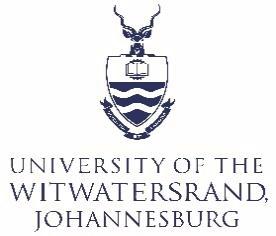
1. In the event of an emergency and/or fire:
The presiding official (Chancellor/Vice-Chancellor/Deputy Vice-Chancellor) will make an announcement requesting guests, graduands and staff to keep calm and remain seated; The Ushers will assist guests to proceed to the nearest Emergency exits in order to evacuate the Great Hall in an orderly fashion; Emergency exit signs are visible in red above all exit doors situated on your left and right hand sides as well as the back of the Hall;
The Ushers will assist the elderly and disabled guests out of the building; The academic procession on stage must exit through the back stage door; Once outside the Great Hall all guests, graduands and staff must proceed to the main assembly point on the piazza.
2. In the event of a Bomb threat
All bomb threats will be treated as real in order to protect lives and property and the premises will be evacuated immediately.

Dear Wits Graduate,
There are a few defining moments in life – and it is without doubt that graduation is one of them!
Today, you enter the world as a graduate from one of the top universities on the African continent. You enter into a world filled with many challenges, but a world that is also filled with limitless possibilities. May you meet all the challenges and opportunities that await you with pride, drive, passion, innovation, social-conscience and positive-purpose.
In addition to earning the degree conferred upon you today, you have also earned the right to be associated with a special group of individuals – the Convocation of Wits University. Convocation represents all the degreed graduates of Wits and forms a vital link between the University and the global community in which it operates. Membership to Convocation is free and serves as an official channel, allowing you, the members, to convey to the University management your views about the University. This membership comes with several unique privileges, which include nominating the Chancellor of the University. The Convocation Executive has two members on the Wits Council (the governing body of the University) and maintains other regular contact with the University to ensure the voice of the Convocation is represented at the highest levels of The University.
There are approximately 250 000 Wits alumni worldwide. The distinction of our university is important to the prestige of our collective qualifications. We call upon you to nurture and enhance the value of your degree by promoting Wits’ image, preserving our values, and contributing towards our ongoing development, ensuring that we grow in stature as a globally competitive, proudly South African institution of higher learning. Please engage with us via our numerous social media channels and keep connected with us so you can access career support, receive invitations to events and reunions and have sight of all the latest news about Wits and prominent Witsies: www.wits.ac.za/alumni/updateyourdetails/
I would like to extend a warm welcome to you – you are now a #Witsie4Life!
Ms Kgomotso Mufamadi President of Convocation Wits University

Convocation is a statutory body that includes all graduates of the University. Convocation is the largest constituency of the University (since the founding of the University in 1922, graduates number over 200 000). Its statutory mandate is to “… discuss and state its opinion upon any matters relating to the University including matters referred to it by the Council” and allows for the views of graduates to be represented at the highest levels of governance of the University.
Words and music by S.B.P. Mnomiya
Anhom
Falalala
Obani labo?
Baphi Ahhom?
Ngibona beza
Beyikazela
Bathwel ‘ongiyane
Bavela kuphi na?
Obani labo?
Ongqondongqondo
Osibakhulu
Yibo labo hhom!
Yini na leyo?
Ihele
Ihele lezingwazi zakithi
Ahhom udwendwe
Ahhom
Udwendwe lwezingqwele zakithi
Nant’ ihele
Longqondongqondo
Nant’ ihele
Losibakhulu
Udwendwe
Udwendwe Iwezingqwele zakithi
Who are those? Which, Falalala?
I see them coming
Walking with swinging garments
They are wearing head rings
Where do they come from?
Who are those?
They are people with knowledge
They are people in authority
These are the ones
What is that?
It is a procession
A procession of our heroes
It is a procession
A procession of our champions
Here is a procession
Of people of knowledge
Here is a procession
Of people of knowledge
A procession
A procession of our heroes
Ihele is known as the ‘Black’ Gaudeamus Igitur. In song, the writer, Mnomiya uses very poetic language to describe a graduation ceremony. The soloist sings of the ‘strange’ procession of people in long robes and head gear. The choir responds by saying that these people are academics who read profound books of knowledge.
Mnomiya goes on to say that the graduates are an inspiration to all of us, and we will also graduate like them one day. The song goes on to wish the graduates well and it ends with a resounding “Halala” (well done!).
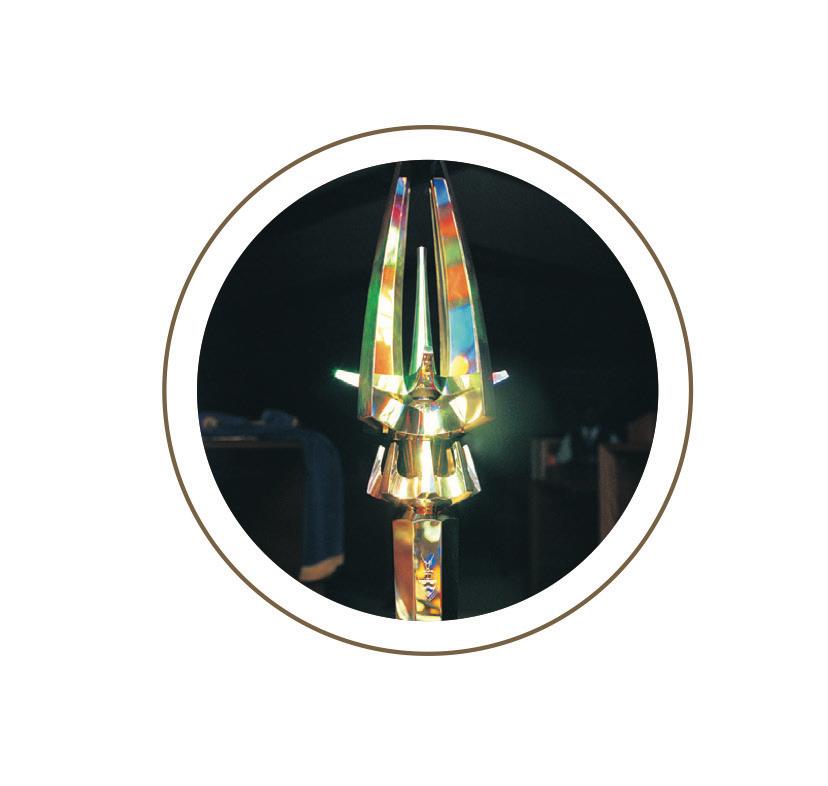
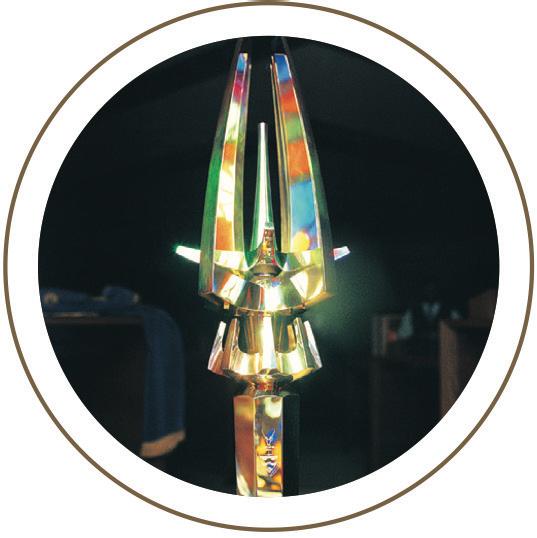
Maces were originally weapons of defence, designed to break through armour. In medieval times, bishops carried a mace instead of a sword into battle to enable them to defend themselves in accordance with the canonical rule that forbade a priest to shed blood. In time, the mace has come to be regarded as a symbol of delegated authority vested in a person or an institution. At this University, it is a symbol of the authority vested in the Chancellor and a reminder of the mandate given by the legislature of this country to the University to grant degrees.
The University mace is the work of the Edinburgh designer, silversmith and engraver, William Kirk, who designed and made the mace of the University of Stirling and of other institutions. It is silver-and gold-plated, is 1070 millimetres long and 180 millimetres broad and weighs seven kilograms. The heraldic devices used in the decoration reflect the character of this University as an institution of learning, set in a mining centre within the Republic of South Africa.
The head of the mace with its spreading vertical blades is symbolic of the horns of a springbok. The central vertical spike is representative of a rock drill on the mine, and the amber stone set in the head is intended as a tribute to a past Chancellor through its association with his name, Bernstein, which in German means amber stone. The heavy quality of the head is consistent with the traditional concept of the mace as a weapon of defence. The collar repeats the shape of the head. It consists of eight cogs which symbolise the cog-wheel in the University coat of arms and represents mining and industry. The shaft is octagonal and divided into three sections. The coat of arms of the University is placed on the shaft under the collar. Below this the words Universitas Witwatersrandensis Johannesburgi: are inscribed, followed by the date in Roman numerals – MCMLXXVI (1977) – which signifies the year of the dedication of the mace.
The mace is a symbolic portrayal of this University, this city, the Witwatersrand and the Republic of South Africa. It is a constant reminder to members of Council and Senate to uphold at all times the rights, powers and privileges of the University and its governing bodies.
The academic dress of this University is patterned on that of the Universities of Oxford and Cambridge, with modifications based on the model of the University of London and certain individual features, particularly in the costumes of office bearers and the hoods of degreesof bachelor and master.
Dress for Office Bearers
• The Chancellor wears a scarlet silk gown with a broad facing of black velvet down each side, embroidered in gold and a black velvet cap with gold cord and tassels.
• The Vice-Chancellor and Principal wears a blue silk gown with a broad facing of gold silk down each side, embroidered in blue, the sleeves being lined with gold silk. The cap is of the same design as that of the Chancellor.
• The Chairman of Council wears a black silk gown with a broad facing of red velvet down each side and around the neck, the sleeves being lined with gold silk. The cap is of the same design as that of the Chancellor.
• The academic dress of the Deputy Vice-Chancellors and the Executive Directors is the same as that of the Vice-Chancellor and Principal, except that the colour of the facing and sleeves of the gown and of the cord and tassels of the cap is silver-grey.
• The gown of the President of Convocation is of blue silk, with a broad facing of gold silk down each side, the sleeves being lined with white silk. The cap is the same as that of the Chancellor, but with a blue cord and tassels.
• The Registrar wears a black silk gown with a broad facing of blue silk down each side, bordered with gold braid. The cap is the same as that of the President of Convocation.
• A member of Council wears a black silk gown with a broad facing of gold silk. The cap is the same as that of the Chancellor.
• The gown of the President of the Students’ Representative Council is black with a broad facing of blue satin.
Graduands’ Gowns
• The gowns for all degrees of bachelor and master of the University are black, of the same pattern as the gown for a Master of Arts at the University of Oxford.
• The gown for the degree of Doctor of Philosophy is scarlet, after the University of London pattern.
• The gown for a senior doctorate is the same as that for the PhD, but with a gold satin facing on each side of the gown and with the sleeve button and cord in gold.
The Academic Hood
The academic hood is the principal feature of the costume for holders of our degrees of bachelor and master. The hood for the PhD is standard, regardless of the Faculty in which the degree was obtained. It is scarlet silk, lined with white silk.
Degree Colours
The hoods reflect the colour or colours of a particular degree or associated degrees.
As a 102-year-old public university in South Africa, Wits is proud of its record of achievement as a significant contributor to our society. We contribute capable people to society that are training in their chosen field that are engaged and able to tackle problems using evidence-based solutions. We also engage with our communities to share knowledge that we create so as to make a positive impact on the quality of life. Wits for Good.
Wits is a world-class research-intensive university based on our intellectual excellence, international competitiveness, and commitment to social justice; all of which have a measurable impact.
Here are a few of many differentiators:
• An international perspective that helps us maintain high standards in teaching and learning and research while not distracting us from our place in Johannesburg, South Africa, and Africa. In 2024 Wits authors published articles with co-authors from 199 universities, 94% of which were from countries other than South Africa.
• An intellectual hub of Africa, a founding member of the African Research University Alliance. In 2024 Wits published 2 342 articles with co-authors in Africa, including 32 articles with Namibia, 61 with Botswana, 87 with Zimbabwe and 36 with Mozambique.
• An active and engaged community leader that takes a stand on social issues and is fully committed to the advancement of the public good.
• A growing contribution to the body of knowledge through peer reviewed academic publications: 4 563 in 2024 and an average growth rate of 4% per year over the last five years.
• Knowledge contribution that is above global quality averages in several fields including: clinical and pre-clinical health studies (76% above global norms); arts and humanities (58% above global norms); life sciences (36% above global norms); physical sciences (12% above global norms).
• Wits is particularly associated with the study of the fields of virology, particle physics and the Higgs Boson, malaria, archaeology, paleontology, paleoanthropology, violence, local and regional politics, geochemistry, rock mechanics, deep mining, forensic anthropology, climate change, migration, social justice, and many more.
• Proud of the four Nobel laureates and the 99 Rhodes Scholars.
• Proud of our current 42 000 students of whom 16 600 (40%) are undertaking postgraduate studies and learning to make their own unique contributions to the global knowledge base.
• Proud of our more than 200 000 graduates. More than 90% of Wits graduates obtain permanent employment within 12 months of graduation.
• Proud of its ability to raise external funding to support and drive its research efforts, with contributions exceeding R 2 billion per annum.